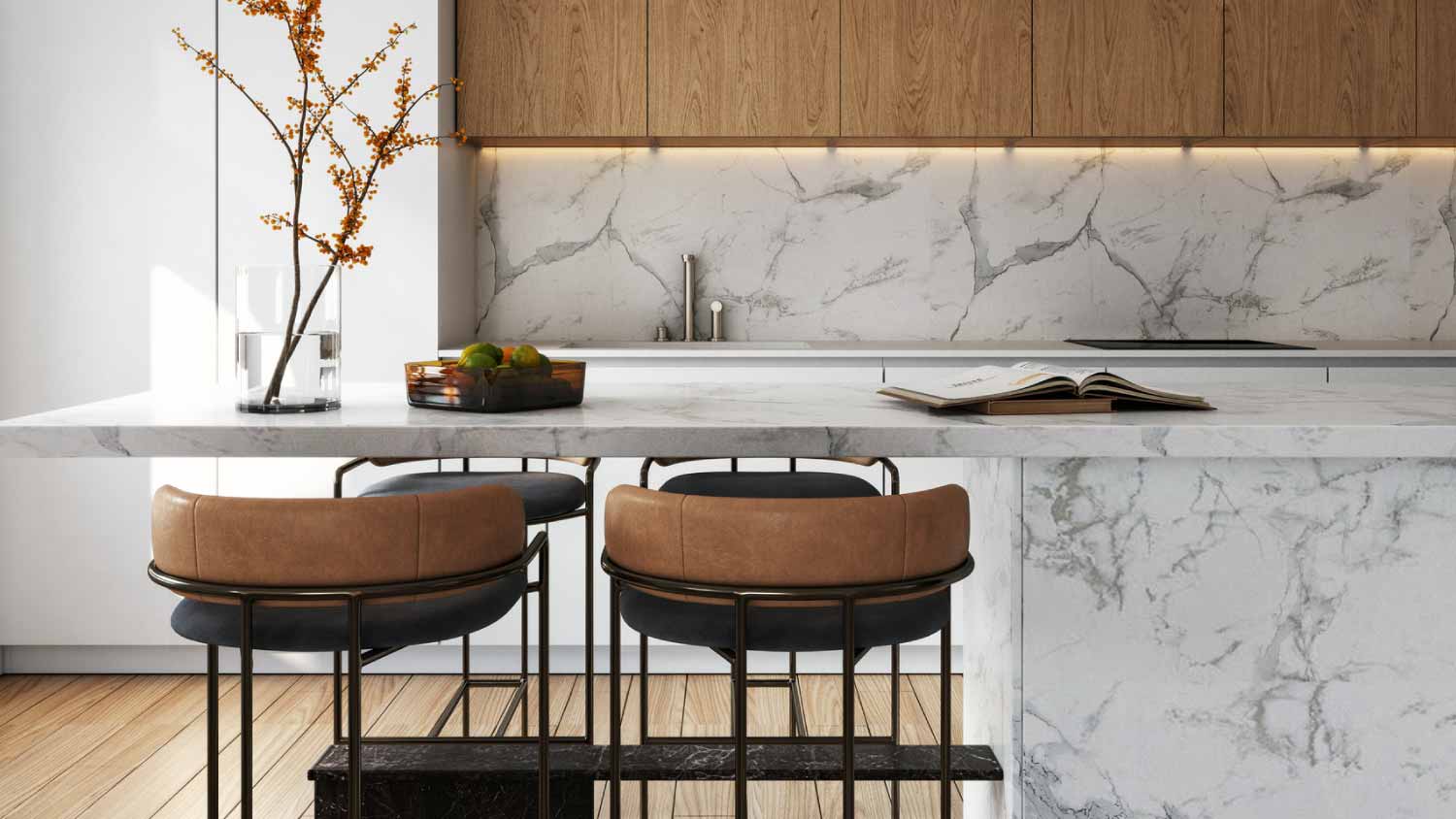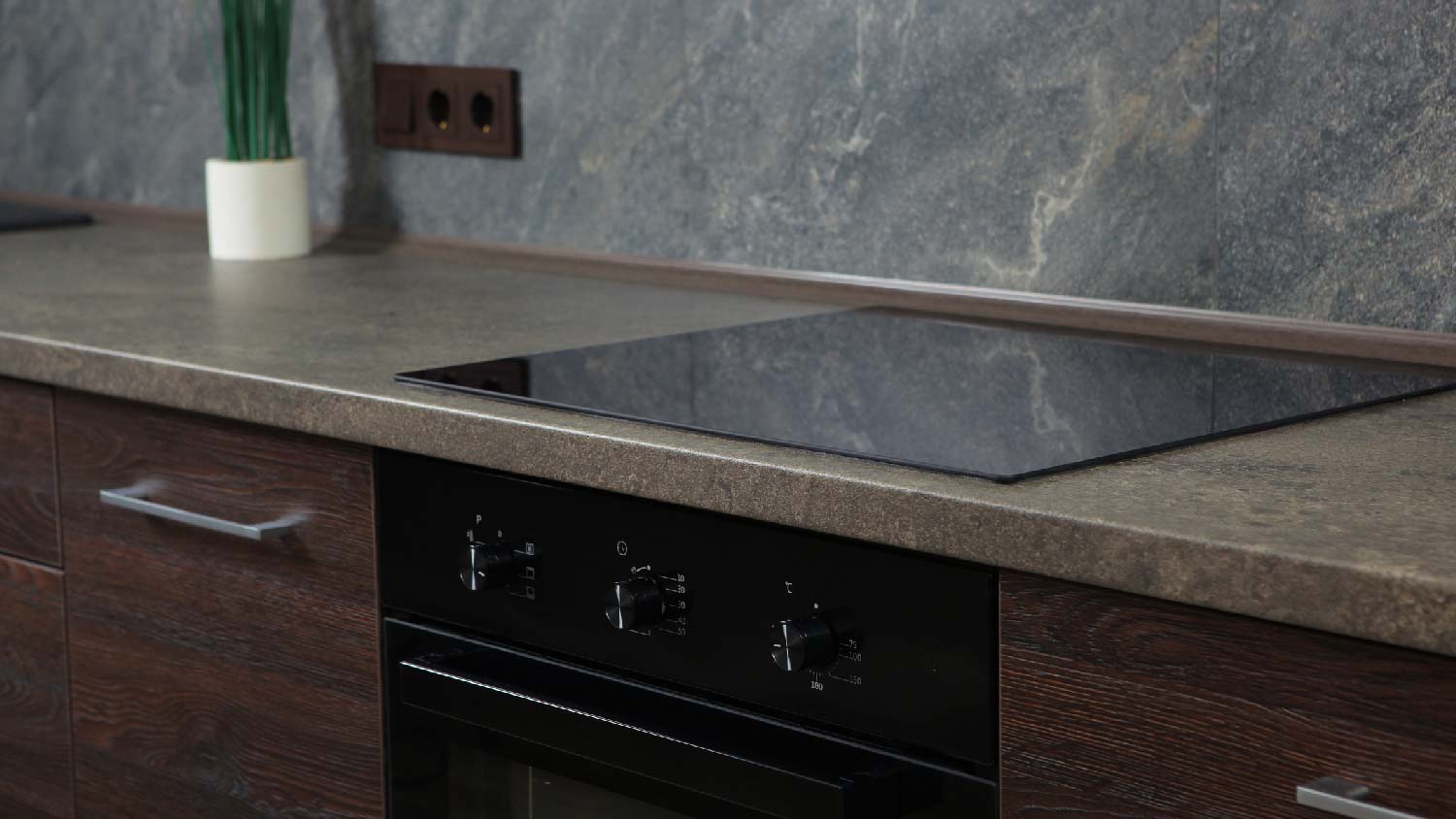The Pros and Cons of Quartz Countertops
With so many benefits, you’ll be courting these counters


Quartz is one of the most durable countertop materials you can get and will last decades.
Since quartz is manufactured using resin and pigments, you can find a countertop with nearly any aesthetic imaginable.
Quartz comes with a pretty hefty price tag of $50 to $200 per square foot.
Quartz is one of the most popular countertop materials you can get your hands on—and for good reason. Often the literal cornerstone of any kitchen, quartz is durable and beautiful, but it’s more expensive than many other types of countertops. If you’re not sure whether this engineered material is right for you, we’ve laid out the pros and cons of quartz countertops to help you make an informed decision.
What Are Quartz Countertops?
Quartz is a manufactured material that mixes natural quartz and minerals with chemical resins and pigments. Also known as engineered stone, a quartz slab is made up of roughly 90–94% ground quartz and 6–10% pigments and resins, which bind and color the quartz grounds. The mixture of quartz and resin is poured into a mold, then pressed, cured, and heated to create the ideal slab. Once it has been inspected, the slab then gets polished to give quartz countertops that signature shine.
Not to be confused with quartzite, which is a natural stone, quartz's blend of natural and synthetic elements results in more durable (and arguably more beautiful) countertops.
Pros of Quartz Countertops
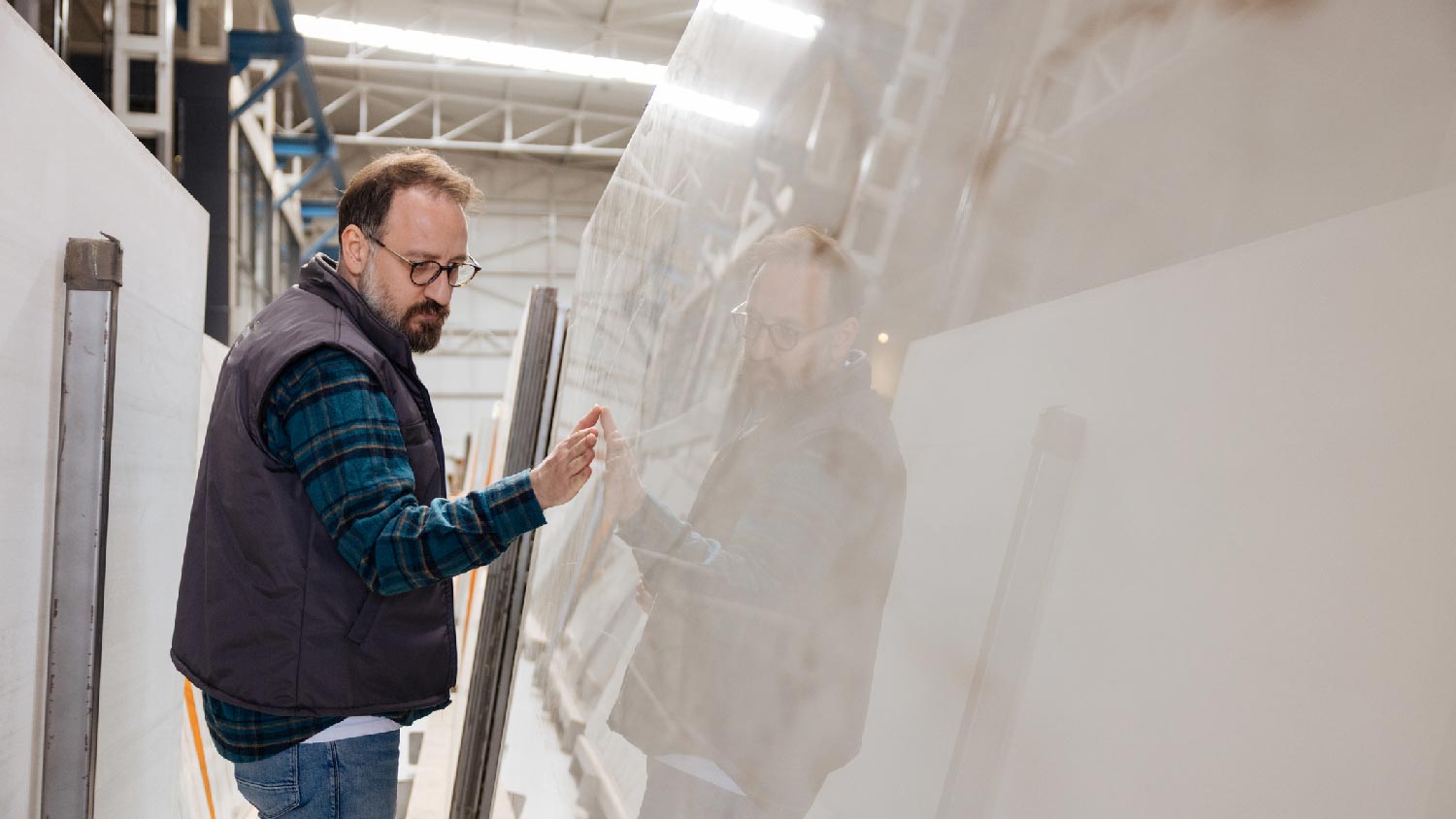
Most pros agree that a quartz countertop has more pros than cons, but it helps to understand what makes it so popular.
Durable
Their intense manufacturing process means quartz countertops are difficult to chip, scratch, or damage. That makes them the perfect home countertop for someone who may not exactly be a Michelin-star chef. You can make all kinds of blunders in the kitchen without worrying about damaging your counters. Because quartz countertops are so durable, some manufacturers offer upwards of 15 to 25 years of protection, so you have extra peace of mind that your investment is protected.
Non-Porous
Quartz doesn’t have tiny pores you need to be worried about, which is a big bonus for cleaning and hygiene. Porous materials, like wood, rubber, and some stones, can absorb bacteria and germs, which you definitely don’t want in your cooking space. The non-porous nature of quartz countertops means you don’t have to worry about any uninvited dinner party guests ruining your meal.
Attractive and Customizable
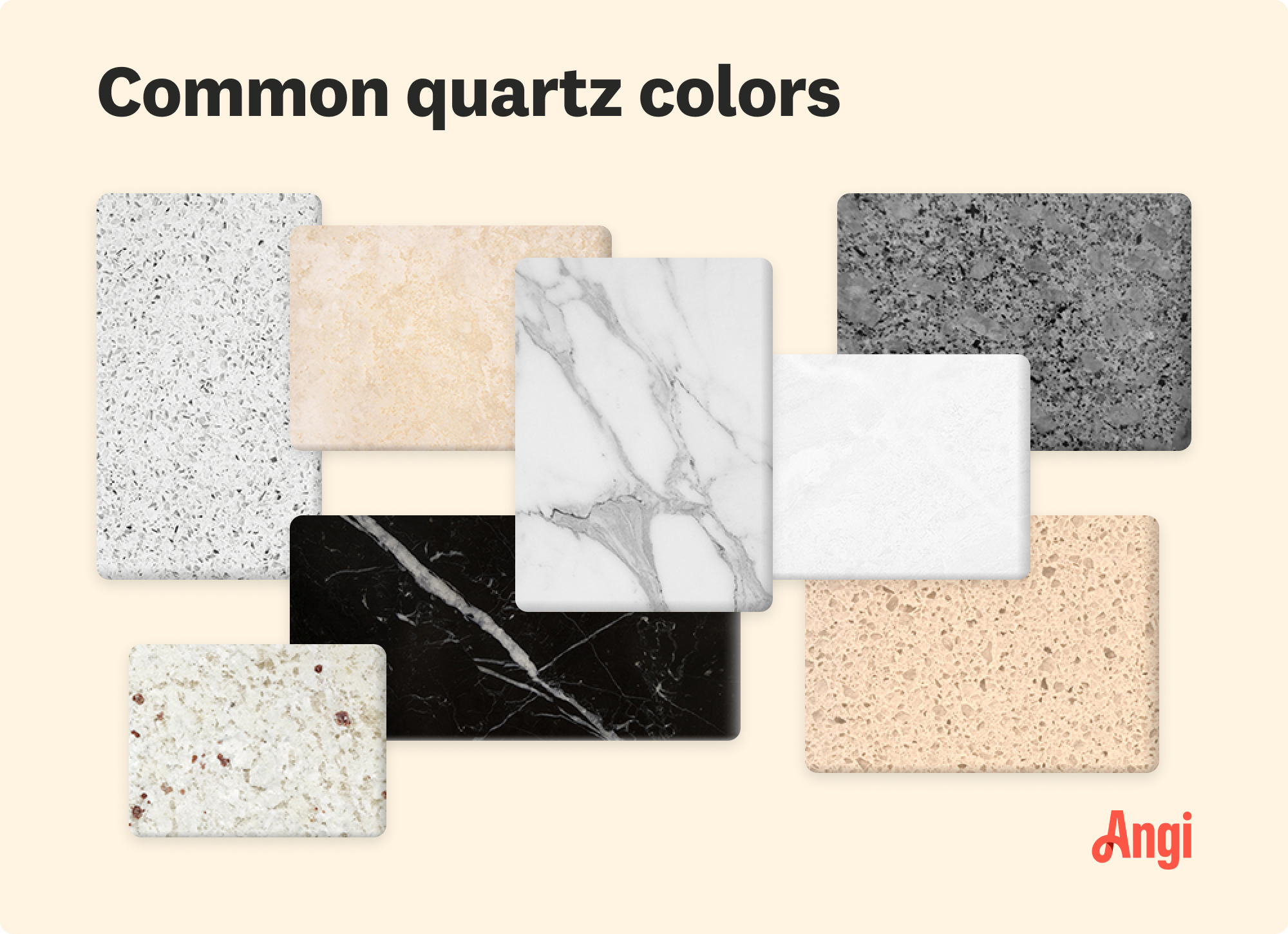
Quartz countertops are manufactured using pigments and resins, offering nearly endless design possibilities in various styles and colors. You can also customize the finish of your quartz countertops, from matte to suede to polished. Want a rounded edge on your countertops? Well, quartz countertops offer a wide range of edging options to help you achieve your desired feel and functionality.
So get creative and find a quartz countertop that matches your style.
Cons of Quartz Countertops
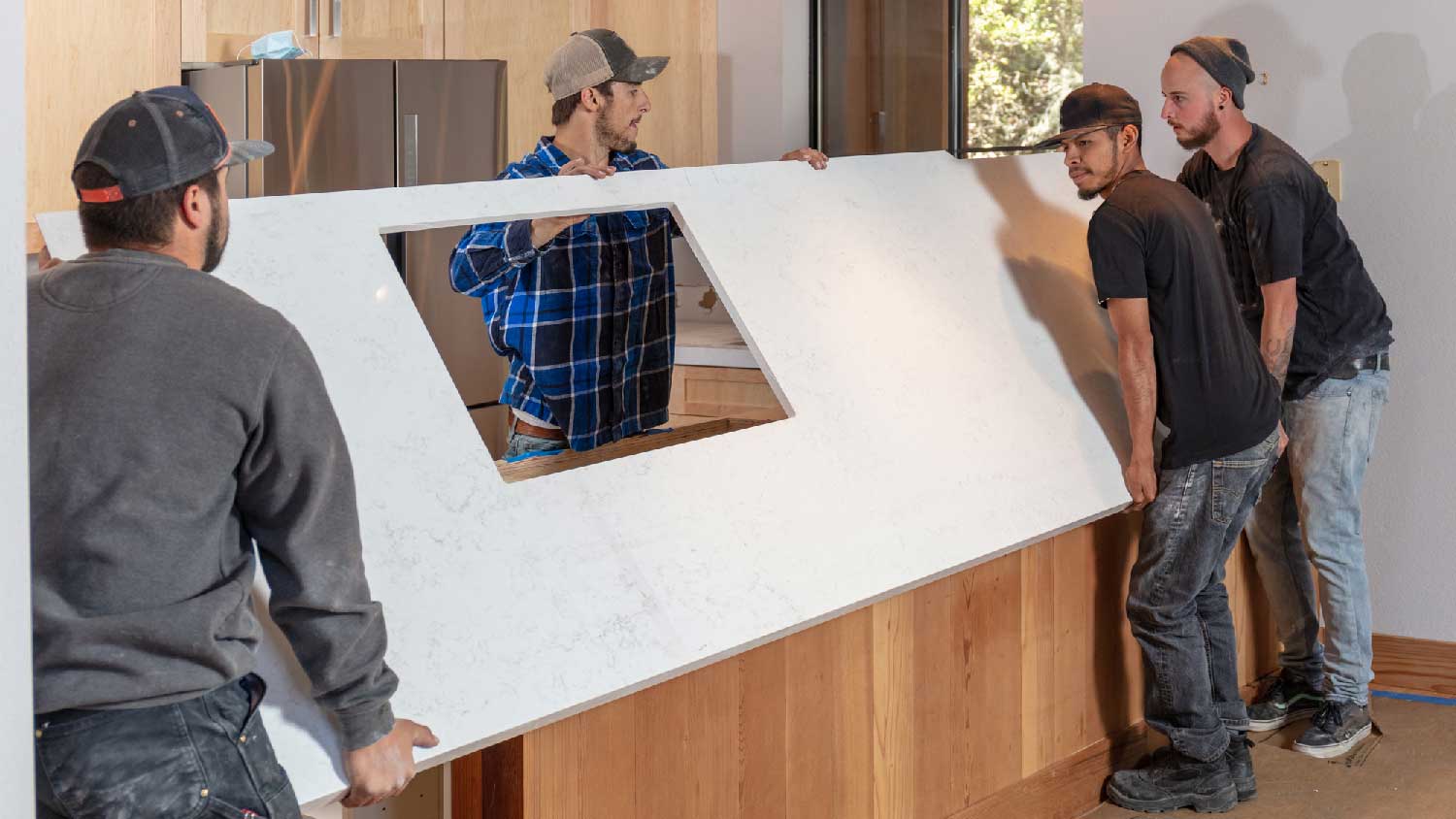
While there are certainly many benefits to quartz countertops, there are still some cons to consider before purchasing.
Cost
Quartz is one of the more expensive countertop materials. The average cost of a quartz countertop is $4,500, and you can pay anywhere from $1,000 to $12,000. The price depends on the size of your countertops, the number of quartz slabs needed to complete the project, the grade quality of the quartz you want, the color and style you choose, the finish of the quartz, and the edging around the slab.
Difficult Installation
The weight of quartz slabs makes installing quartz countertops a pretty intense job—a raw slab can easily weigh 1,000 pounds or more. Installation can cost anywhere from $10 to $30 per square foot and requires safety equipment and experienced handling. Installing quartz countertops requires a certain level of expertise, which doesn’t come cheap, but hiring a local countertop installer is well worth the cost.
May Scorch or Burn
Quartz countertops are heat-resistant, but high heat could melt the resin used to make them. A standard quartz countertop can withstand up to about 150 degrees Fahrenheit of heat before any serious damage can occur—which can be anything from discoloration to warping. So be sure to grab a hotplate before setting down anything coming off the stove or out of the oven to preserve your quartz countertops.
Alternatives to Quartz Countertops

If you’re looking for a cheaper option for your countertops or just want something a little different, there are plenty of alternatives to quartz countertops.
Granite
While not as versatile in appearance, many types of granite countertops offer a natural, one-of-a-kind appearance with more heat resistance. They are also less expensive, around $15 to $140 per square foot.
Unfortunately, granite tends to be less durable than quartz countertops, is difficult to repair, and requires quite a bit more maintenance—needing to be resealed every 12 to 18 months—to prevent stains and bacteria from collecting.
Porcelain
There are many benefits of porcelain countertops that make them a great alternative to quartz. They’re heat-resistant, easy to maintain, and resist discoloration. Porcelain countertops also offer versatility in color and size, are environmentally friendly, and are more durable than granite.
Unfortunately, porcelain is nearly as expensive as quartz, ranging from $50 to $120 per square foot. Porcelain countertops can also crack with enough force, and you’ll need to replace your entire countertop if you can’t handle living with the crack.
Marble
Marble is one of the most eye-catching and aesthetically pleasing materials out there, and it makes a fine choice for a countertop. Installing marble countertops costs an average of $2,000 to $5,000 or $60 per square foot for materials, but the type of marble you choose can raise the price to $15,000 or more. It’s a bit more expensive than quartz, but offers an iconic visual style.
One downside is that marble is porous and prone to scratches, so exercise caution once installed. Unfortunately, this is one of the most expensive countertop types to fix. Repairing a marble countertop costs $200 to $1,200.
How Much Do Quartz Countertops Cost?
Installing a quartz countertop costs anywhere from $1,500 to $8,000, though unique projects can go even higher than that. The cost fluctuates according to the price of the quartz itself, which ranges from $50 to $200 per square foot. The number of slabs you need and the grade quality of the quartz are the biggest cost factors. As for labor, you’ll pay around $10 to $30 per square foot.
DIY vs. Hiring a Pro
Quartz countertops are heavy, cumbersome, and difficult to install. We don’t recommend going the DIY route here unless you have plenty of experience with kitchen fixtures and with quartz in particular. Improper installation will lead to problems down the line and almost certainly will impact the overall durability and lifespan of the finished product. Go with a local countertop installation pro who regularly works with this material and understands the unique installation requirements of quartz.
Frequently Asked Questions
Quartz countertops are not recommended for outdoor use. Because of their lack of resistance to high heat and UV rays, they might experience discoloration sooner than they would inside. It’s best to stick with a natural stone for outdoor use, like granite, for a longer-lasting outdoor countertop you can count on.
You should not put a hot pan or pot on a quartz countertop. Due to the binding resin, quartz is particularly sensitive to extreme heat, so this could cause a cosmetic issue. If the heat exceeds 150 degrees F, it could burn the countertop and cause permanent damage.
Quartz countertops are known for their durability, but they aren’t indestructible. Quartz countertops can crack under extreme pressure, like when experiencing a heavy impact. The same can happen with regular exposure to high temperatures. Finally, improper installation makes the quartz more vulnerable.
A countertop contractor is the best person to install your quartz countertop. Because installing quartz countertops can be challenging, it’s important to consult a professional with experience installing quartz slabs to get the job done right. Repairing quartz countertops can be expensive, so it’s important to hire a professional to avoid damage.



